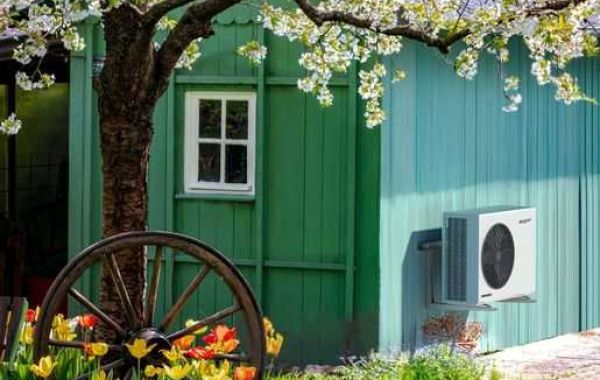Heat pumps have been increasingly gaining attention as a more sustainable and efficient alternative to traditional heating and cooling systems in Europe. To encourage their adoption, many European countries have implemented various grants and incentives. However, the availability and level of aids vary greatly from country to country.
How do air source heat pumps work?
Air source heat pumps work by extracting heat from the air, ground, or water sources and using it to heat buildings and water. They can additionally be used in reverse to cool buildings during hot weather. What’s more, Zealux’s Inverboost technology is considered to be a more sustainable alternative to traditional heating systems as it is more energy-efficient, produces fewer carbon emissions, and can help to reduce heating costs for households and businesses.
Northern European has been at the forefront of heat pump adoption
In general, Northern European countries such as Sweden, Norway, Denmark, and Finland have been at the forefront of heat pump adoption, and as a result, they offer some of the most generous support. For instance, in Sweden, households can receive up to 45% of the total cost of purchasing and installing a heat pump. Additionally, there is a maximum subsidy amount, which varies depending on the type of heat pump and the size of the building. In Norway, there is a 25% tax reduction for heat pump installations, while in Denmark, subsidies cover up to 30% of the cost of installation. In Finland, the government provides a 40% subsidy for residential heat pump installations.
These countries' governments understand that heat pumps can help to reduce the carbon footprint of their citizens, and they are committed to promoting sustainable energy use. As a result, they have implemented policies that encourage the adoption of heat pumps, making them more affordable for households and businesses.
The UK
Similarly, the UK has as well been offering generous subsidies for heat pump adoption, particularly for low-income households. The government's Green Homes Grant scheme offers up to £5,000 in vouchers for homeowners to install heat pumps. Additionally, the UK government has further announced a Renewable Heat Incentive (RHI) scheme that provides financial support to both households and businesses that adopt renewable heating technologies such as heat pumps. This incentive scheme offers a payment for seven years based on the amount of renewable heat generated by the system.
Southern and Eastern European countries
In contrast, Southern and Eastern European countries have been slower in adopting heat pumps, and as a result, the level of subsidies is generally lower. In Italy, for instance, there are no specific subsidies for heat pumps, although households can access a tax credit of up to 50% for energy-efficient home renovations. Similarly, in Spain, subsidies for heat pump installations are limited, and they are usually tied to larger-scale renewable energy projects.
The lower subsidies in Southern and Eastern European countries are mainly due to the fact that these regions are generally warmer than their northern counterparts. Therefore, the demand for heating is not as high, and there is less of an incentive to invest in more efficient heating systems. Additionally, the cost of living is generally lower in these countries, and households may not have the financial capabilities to invest in heat pumps.
Germany
In Germany, the government offers a subsidy of up to 45% of the cost of installing a heat pump, but the eligibility criteria are quite strict, and the process can be quite complicated. The German government yet has a "Marktanreizprogramm" (MAP) that offers subsidies for renewable energy installations, including heat pumps. This program provides incentives for both households and businesses, but the amount of subsidy varies depending on the type of installation.
France
In France, subsidies for heat pumps are generally available through the "MaPrimeRenov" program, which provides financial support to homeowners who wish to carry out energy-efficient renovations in their homes. The amount of subsidy varies depending on the household's income, and it is generally higher for low-income households. The French government similarly offers a tax credit for energy-efficient home renovations, which can include heat pump installations.
Netherlands
The Netherlands offers a subsidy for heat pump installations through its "Investeringssubsidie Duurzame Energie" (ISDE) program. This program provides subsidies for a range of renewable energy installations, including heat pumps, solar panels, and biomass boilers. The subsidy amount varies depending on the type of installation and the energy savings it generates.
In summary, the availability and level of heat pump subsidies across Europe vary greatly from country to country. Northern European countries such as Sweden, Norway, Denmark, and Finland offer some of the most generous subsidies, while Southern and Eastern European countries generally have lower subsidies. The UK, Germany, France, and the Netherlands equally offer subsidies for heat pump adoption, but the eligibility criteria, subsidy amounts, and application processes differ from country to country.
The trend is towards more incentives and subsidies for renewable energy and energy-efficient systems. This is driven by the need to reduce carbon emissions and mitigate the effects of climate change. As heat pumps become more popular and affordable, we can expect to see more governments offering incentives to encourage their adoption, making them a more accessible and sustainable option for households and businesses across Europe.
Companies and air source heat pump manufacturers, sell, and install air source heat pumps are impacted by the subsidies offered by governments across Europe. In general, companies can benefit from subsidies. When governments offer subsidies for air source heat pumps, it incentivizes households and businesses to adopt this technology. As a result, demand for air source heat pumps can increase, which can benefit companies that sell and install these systems. Zealux also benefits from increased consumer awareness with Inverboost technology, as subsidies can help to promote air source heat pumps as a viable and cost-effective solution for heating and cooling.

 air source heating
air source heating





